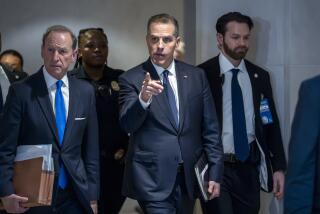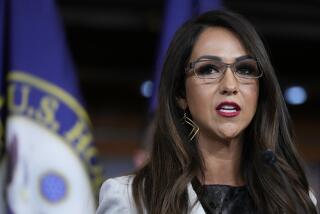Packwood’s Accusers Brace for Hearings
- Share via
SEATTLE — For months, women like Kerry Whitney say they have been waiting for the day they could tell the world what happened. Whitney, now a department store employee in Dallas, Tex., used to run one of the elevators at the U.S. Capitol. She wants Sen. Bob Packwood to answer to the nation for what she says he did to her in that elevator.
But now that the Oregon Republican has agreed to seek public hearings on allegations of sexual harassment and other misconduct, Whitney and 16 other women who have filed complaints face the difficult prospect of a head-to-head confrontation with the man they have accused--and a likely attempt to discredit their recollections in front of a national television audience.
“It’s frightening. I feel vulnerable,” Whitney said Saturday. “But at the same time, I feel for the sake of the country that it needs to be done.”
In interviews over the past two days, several women who have accused Packwood of grabbing, fondling and kissing them during the course of Capitol business over 21 years said it is likely that all will voluntarily come forward to testify, despite fears that they, and not Packwood, could become the accused.
“The women, I’m sure all their reaction was the same: ‘Oh my God, we got what we wanted,’ ” said a lawyer representing one of Packwood’s accusers. “They all want this hearing, but not if it’s going to be more open season on women in the Senate.”
Public hearings, which Packwood requested Friday after previously rejecting them, will give the women the chance they are seeking to confront the powerful Senate Finance Committee chairman with their accusations of sexual misconduct and impropriety and force him to respond publicly. But the hearings will also allow Packwood and his supporters to attempt to publicly undermine the women’s credibility and confront them with the senator’s claims of exaggerations and falsehoods.
Already, Packwood’s defenders have accused at least one of the women of making sexual overtures toward the senator, and it appears likely that the women will be required to address such charges before the Senate Ethics Committee. But the questioning is expected to be limited to their encounters with the influential lawmaker: Under Senate rules, the federal rape shield law would not permit any evidence of a women’s sexual conduct unrelated to Packwood to be aired before the committee.
Nonetheless, the women said they are mindful of the public ordeal Oklahoma law professor Anita Faye Hill underwent in 1991 when she testified before the Senate Judiciary Committee about alleged sexual harassment by then-Supreme Court nominee Clarence Thomas.
“The committee has always said that it would have the rape shield rule in place for the case, which means that only our history relating to Sen. Packwood is relevant to the case. The issue is whether or not they’ll be able to control him and his buddies outside of the hearing,” said Julie Williamson, who has said that Packwood grabbed her, kissed her, pulled her head and tried to pull her girdle off when she worked for him as a 30-year-old staffer in 1969. Packwood has accused her of lying.
“He has been in the last several weeks engaging in a pattern of trying to cast aspersions on the women by innuendo,” Williamson said. “But I don’t think anyone’s going to be frightened away from the hearings by him. I think we have gone on record with the Ethics Committee. As far as I know, we have all agreed to participate in open hearings because we know we’re telling the truth, and we believe there will be enough evidence that people will be appalled if they have a chance to know what it is. I think he will inflict as much pain as he’s allowed to in the process, but I hope people will have enough sense to take his nonsense with a grain of salt.”
One of the probable witnesses is Celia Rosebury Lighthill, a San Francisco psychotherapist who came forward with her allegations about Packwood only recently, causing the Ethics Committee to delay resolution of its inquiry. Lighthill, whose claims are among those Packwood cited in explaining his decision to seek a public hearing, said she has frequently been urged to simply drop the matter.
“Already I’ve had so many people say it was just a kiss, and what happened to me with him was just minor,” she said.
The prospect of public hearings is likely to generate even more such suggestions, she acknowledged, but she is determined to stand her ground.
“A kiss is just a kiss. But it’s not just about a kiss. It’s about power and misuse of power. I’m not looking forward to something like this, but I welcome the opportunity to try and help people understand why this is an injustice that has wider repercussions than just a kiss,” Lighthill said.
Whitney said not all of the women are seeking a public apology. In her case, she noted, Packwood has already apologized, though he has said because of his past drinking he could not recall some of the alleged events.
“If he says he didn’t remember any of these incidents, it’s a little bit frightening in my case,” she said. “Most of the time he was in my elevator, he was on his way to the Senate floor to make votes. If he was drunk and blacking out to the point he didn’t remember, it’s a little bit frightening.”
Lawyers for the women say it is not clear whether the committee, if it decides to accept Packwood’s request for hearings, would subpoena testimony from accusers who do not wish to be publicly identified.
Without public hearings, Packwood said in a CNN interview broadcast Saturday, “any accuser who wants to remain anonymous will be allowed to remain anonymous. That isn’t fair. That isn’t American.” Up until now, he complained, the Ethics Committee has not permitted him to subpoena witnesses, but with a public hearing, “you don’t come forth with a paper bag over your head.”
So far, 10 of the 17 women whose accusations were included in the Ethics Committee’s original report have been publicly identified.
A woman who says Packwood grabbed and kissed her in 1983 when she was 17 has declined to be identified. But her lawyer, W. Neil Eggleston, said she plans to testify. “She has not wanted to give up her privacy over this, but she’s felt a responsibility to the Ethics Committee and the process. If there is a public hearing, she will testify.”
Betty Roberts of the Women’s Legal Advocacy Fund in Portland, Ore., has assisted Packwood’s accusers with free legal help and fund raising. She predicted that all of the women would come forward.
“Nobody likes to do this,” she said. “Many of these women have said: ‘If this is just going to be a trial in the press and not the real thing and we’re not going to go before the Ethics Committee, then we don’t want to be scrutinized publicly.’ But most of them have said: ‘If the committee has a public hearing, then I will allow myself to be publicly identified.’ ”
In many cases, she said, the women or their husbands still have government jobs in Washington. “It may be they’re protecting their business or their children. . . . Many of them just don’t want to deal with it: ‘Oh, you were one of the Packwood women.’ ”
More to Read
Sign up for Essential California
The most important California stories and recommendations in your inbox every morning.
You may occasionally receive promotional content from the Los Angeles Times.













